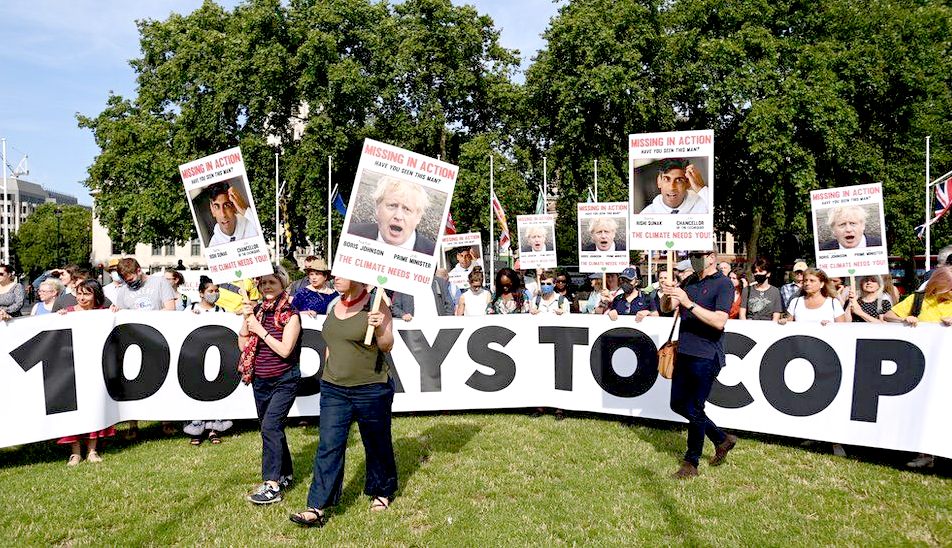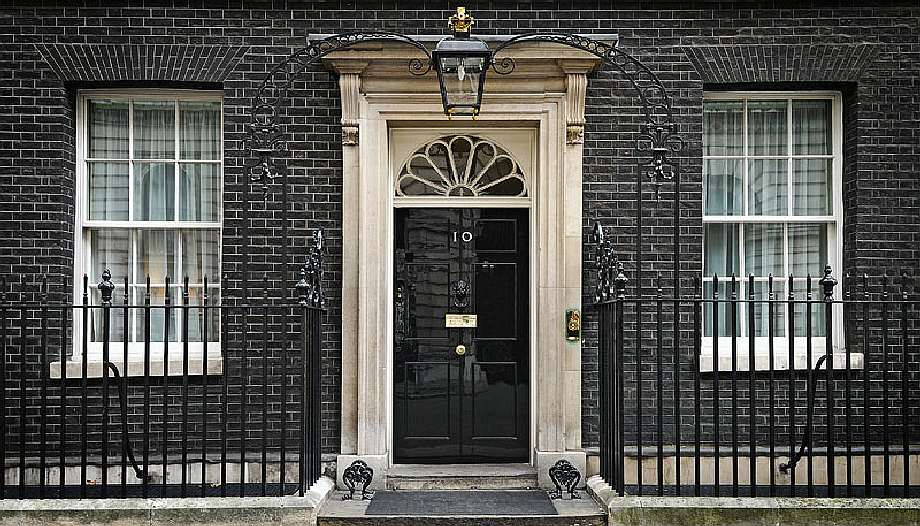
CLIMATE
CRIMINALS - We
pay our taxes but get no value for all our hard earned pounds. Our income is taxed along with just about everything we
buy in staged policies designed to milk the electorate dry. The reason,
to make up for gross incompetence in general. That is what they do not
want you to find out about. Mass protests are a safer bet, though the
organizers will sometimes be singled out for a nice prosecution, after
they have harried their poor victim using all other agencies. So beware.
Make sure your house is in order before protesting.
Generally,
Councils have low intellectual capacities, following the herd at a very
base level. Allegedly, this is the main reason
for becoming a civil servant, or a councillor, while looking for high
earnings, living off the sweat of the brows of others, or simply raking
in an attendance allowance, while feeling important, but actually, not
really understanding what is going on behind the scenes, except sufficiently to be able to
do favours for friends. And all that takes is raising your hand at the
right moment - and never, never, declaring an interest.
To make up for their low-brow, councils
(collectively) learn how to screw the electorate in Gestapo
fashion, taking their lead from (typically) corrupt planning officers
and executives, allegedly, who are as crafty as a cart load of monkeys
when it comes to making the most of their positions of trust. These are
powerful positions, where planning consents are involved, literally
dishing out £$ millions in value for permits, that are after all just
pieces of paper. It is the same as printing money. And paper money has
no real value today, as it did in the old days with silver
or gold
to back up the demand to pay the bearer. The promise on a modern note,
is basically a lie. For there is no Pound or Dollar's worth of anything
to be able to pay anyone. When there is a call on currency, the banks
simply shut their doors and the Stock Markets suspend trading.
Councils'
work with other agencies, hand in glove, to quash
all attempts at individuals to raise awareness of their shortcomings. The
more a person questions the system, the more pressure will be applied
to quash that person, who will then have a target painted on their back,
and eventually, will become a victim of institutionalised
wrong-doing. Because, councils nearly always go too far.
It is wrong, because such treatment
is not only malfeasance in public office, but is illegal in Human
Rights terms, and a conspiracy to cause harm, as such actions become
vendettas, raises such actions to a level where the police become an
accessory to crimes, instead of prosecuting the offenders and protecting
the victims of such abuse.
Sounds crazy,
but it is true. We live in a police state the likes of which Adolf
Hitler, could not have engineered better. A good example of a SLAPP
action that went wrong, is the case of James
Ashley, who was gunned down in his bedroom, while naked, in the
early hours of the morning by armed Sussex
police officers on January 15, 1998, based on fabricated
intelligence of drug dealing provided by Wealden or Rother (or both) District
councils. No trace of drugs was found at the scene of the shooting.
Another favorite ruse by councils is to allege firearms are kept on the
premises, then say to Sussex police that a target is mentally unbalanced,
and ask for their help (again), suggestive of the need for an armed raid. Indeed, we
have seen correspondence between Wealden and Sussex police like this
from 1998, aimed at another person, but this was someone challenging the
planning system and deemed corruption, after a Petition in 1997 had been
fudged, with cooperation from the CPS, who must have known that there
were no police interviews of the Complainants, hence no Statements - the
basis of taking and investigating of all complaints from victims of
crime.
The
problem for Wealden and their brothers in arms, Sussex police, was that
the persons or group raising the alarm were right. The council's officers'
were corrupt, and their chief executives complicit in covering up the
crimes - with the then councillors failing to represent the electorate,
just staying silent, playing deaf and dumb. The problem being a conflict of interest, where
the police had
to pretend to take the complaints seriously, then defuse them.

ADOLF
HITLER - To win control of a country, you must first disarm it's
citizens. Dear old Adolf learned a lot from the Brits. He loved the
British idea of concentration camps so much he took it to heart at an
industrial level. Adolf's Gestapo carried out a similar function to
English councils and police forces today, they used their authority to intimidate
and wear down the political opponents that they themselves create, in
abusing the planning system for the gain of some, and denial of rights
to others.
In
the digital age with Artificially Intelligent computers and algorithms,
it would be possible to cross reference planning consents with others in
regions and districts, to spot inconsistencies (grants and refusals),
hence, corruption or discrimination. Consents that should not have been
given because of ownership conflicts would be easy to spot, against
failure to declare an interest. Councillors would be tagged, or facial
recognition used so that powerful computers would know who was in a committee
chamber and who should not be. Votes should be attributed, not just a
simple count of hands, that is too anonymous. The use of Land Registry
details would also be used to spot inappropriate development, conflicts
of interest, or money laundering.
IN
THE USA - WHAT IS A SLAPP?
The rights to speech and petition are enshrined in the First Amendment to the United States Constitution. Free speech and healthy debate are vital to the well-being of a democracy. In fact, the United States Supreme Court has said that the right to petition the government is the very foundation of our democracy.
SLAPP = Strategic Lawsuit Against Public Participation
SLAPPs are Strategic Lawsuits Against Public Participation. These damaging suits chill free speech and healthy debate by targeting those who communicate with their government or speak out on issues of public interest.
SLAPPs are used to silence and harass critics by forcing them to spend money to defend these baseless suits. SLAPP filers don’t go to court to seek justice. Rather, SLAPPS are intended to intimidate those who disagree with them or their activities by draining the target’s financial resources.
SLAPPs are effective because even a meritless lawsuit can take years and many thousands of dollars to defend. To end or prevent a SLAPP, those who speak out on issues of public interest frequently agree to muzzle themselves, apologize, or “correct” statements.
THE
CIRCUS - MARCH 2020 - PINKY & PERKY
|

Boris
Johnson
Prime
Minister
|

Rishi
Sunack
Chancellor
Exchequer
|

Priti
Patel
Home
Secretary
|

Dominic
Raab
Foreign
Secretary
|

Michael
Gove
Chancellor
D. Lancaster
|

Ben
Wallace
Defence
Secretary
|
|

Matt
Hancock
Health
& Social Care
|

Liz
Truss
International
Trade
|

Gavin
Williamson
Education
|

Oliver
Dowden
Culture
|

Alok
Sharma
MP
Reading West
|

Robert
Jenrick
Housing,
Local Gov.
|
|

Therese
Coffey
Work
& Pensions
|

Robert
Buckland
Justice
|

Anne-Marie
Trevelyan
International
Dev.
|

Grant
Shapps
Transport
|

George
Eustice
Environment
|

Brandon
Lewis
Northern
Ireland
|
|

Alister
Jack
Scottish
Sec. State
|

Simon
Hart
Welsh
Sec. State
|

Baroness
Evans
Leader
Lords
|

Amanda
Milling
Party
Chairman
|

Jacob
Rees-Mogg
Leader
Commons
|

Mark
Spencer
Chief
Whip
|
|
|

Suella
Braverman
Attorney
General
|
|

Stephen
Barclay
Treasury
Sec.
|
|
|

In
the UK, historically, both
Labour and Conservative
politicians have in the past engaged in the practice of quashing public criticism, using all means at their
disposal, legal and illegal. They get away with it because there is no
article 13 right to an effective remedy in the United Kingdom, and of
course, we don't have a Written Constitution, meaning that the Courts
are not independent. Judges can be bought with knighthoods
and other titles. The British justice system is riddled with secret
society favours for Masons. The CPS is corrupt, using police to raid
premises to obtain privileged legal papers, to craft cases, to ensure a
good fit up. Where the CPS is supposed to be independent, but there is
evidence to suggest otherwise. Yes, the police frame political adversaries for councils,
and banks.
IN EUROPE - 9 DECEMBER 2020 - The increasing rise, and impact, of SLAPPs: Strategic Lawsuits Against Public Participation
Strategic lawsuits against public participation (SLAPPs) are legal actions that are taken not necessarily with the goal of winning in court, but which instead aim to intimidate, to induce fear, to tire and consume the financial and psychological resources of the target. SLAPPs are initiated by influential elites, often state actors, business entities or powerful individuals, and their targets include journalists, human rights defenders, civil society organisations, activists, academics and anyone else who expresses an opinion on a public matter that is uncomfortable for this elite. The desired outcome is to silence the speaker and have a chilling effect on other critical and dissenting voices.
A Europe-wide problem
SLAPPs are not defined aspects of law themselves. Instead, they can be characterised by the manner in which a range of laws concerning typically defamation, but also other torts, labour laws, privacy and data protection, are used by litigants to threaten parties into silence, either through the retraction of published public interest reporting (oftentimes coupled with extensive punitive threats) or the coerced commitment to not publish in the first place. A few examples may serve to demonstrate the scope of SLAPPs being used against journalists across Europe:
In Poland, since the Law and Justice (PiS) party came to power in 2015, the country’s second-largest daily newspaper Gazeta Wyborcza has received over 55 legal threats as a result of its work. The cases are brought by powerful state actors such as the Deputy Prime Minister and PiS chairman, Jarosław Kaczyński; the state television broadcaster, Telewizja Polska S.A.; and, other state-owned companies and individuals with close ties to the governing party. The claims in the cases against Gazeta Wyborcza include civil defamation and infringement of personal interests, which is also protected under the Polish Civil Code.[1]
In 2019 Inès Léraud, a French independent journalist, was sued for defamation by Christian Buson, a Breton agri-food business owner following her investigation, published as graphic novel Green seaweed – the forbidden story, into the proliferation of seaweed in Brittany. The case was dropped a few days before the start of the trial. Recently, another defamation case was brought against Léraud by the business tycoon Jean Chéritel, CEO of the Chéritel group. The trial is due to start in January 2021.[2]
In Malta, currently 25 civil defamation cases are still active against Daphne Caruana Galizia, an investigative journalist who was assassinated on 16 October 2017. At the time of her death, she was facing 47 civil and criminal libel suits filed in various jurisdictions, including Malta and the US.[3] Recently, new legal threats have also been received by the Daphne Caruana Galizia Foundation. On 20 and 26 October 2020, the Foundation received two letters from Maggesi Maggi Mazza & Partners, an international law firm representing Domenico Lagrotteria and Vincenzo Giuliano, two businessmen mentioned in articles written by Caruana Galizia, who base part of their claim to have those articles removed on the European Union (EU) General Data Protection Regulation (GDPR).[4]
In addition to civil cases, criminal defamation cases are also used as part of a wider strategy to limit public pariticipation. For example, in Slovenia three journalists from the investigative news website Necenzurirano (Uncensored) are facing a total of 39 vexatious defamation lawsuits. The criminal defamation complaints were filed throughout August and September 2020, by Rok Snežić, a tax expert and unofficial financial advisor to the Slovenian Prime Minister. The targets of the lawsuits, journalists Primož Cirman, Vesna Vukovic and Thomas Modica, currently each have 13 cases open against them. If found guilty, the journalists face fines or up to a year in prison. On 25 September, the Slovenian Association of Journalists (DNS) published a statement expressing concern about what it called the “systematic persecution” of the portal’s journalists by Snežić.[5]
A threat to the EU legal order
SLAPPs are not only a Europe-wide issue but they also represent a threat to the EU’s legal order. First, they are a threat to democracy and human rights, by impairing the right to freedom of expression of those who speak up in the public interest and through their chilling effect and impact on public interest activities more broadly. Furthermore, to the extent that they distort and abuse the system of civil law remedies, SLAPPs undermine the mutual trust between EU legal systems and as such, pose a threat to access to justice and judicial cooperation.
Additionally, because they undermine scrutiny by independent watchdogs, SLAPPs are a threat to the effective enforcement of EU law, including in connection to the internal market and the protection of the EU budget, which cannot be monitored solely by the European Commission. Lastly, SLAPPs are a threat also to the freedom of movement, as they discourage potential targets from confidently operating in jurisdictions where the risk of SLAPPs is higher.
According to a recent study commissioned by the European Commission, SLAPPs are “increasingly used across EU member states, in an environment that is getting more and more hostile towards journalists, human rights defenders and various NGOs.”[6] Moreover, no EU member state has enacted targeted rules to provide protection against SLAPPs. To address this gap in protection, a broad coalition of civil society organisations have been advocating for the EU to undertake a number of complimentary steps.[7] In particular, the EU must: reform the Brussels I (recast) and Rome II Regulations to end forum shopping and regulate applicable law in defamation cases; morally and financially support the victims of SLAPPs; and, enact an anti-SLAPP Directive.
An anti-SLAPP Directive is needed to establish harmonised EU-wide minimum standards of protection, including appropriate procedural safeguards, supportive and protective measures for targets, as well as deterrent and awareness-raising provisions. Among other things, the Directive should ensure that procedural tools exist in all EU member states to allow courts to consider a motion for dismissal as soon as possible after proceedings are initiated. If the court is satisfied that the claim arises from the defendant’s public participation on matters of public interest, moreover, the burden of proof should be reversed, leaving it to the plaintiff to demonstrate that the action has a reasonable prospect of success and that it was not initiated or maintained for an improper purpose. Further, the Directive should include provisions that ensure that SLAPP litigants who see their claim dismissed are ordered to pay costs to the defendant on a full indemnity basis. Deterrent measures may further also include the imposition of penalties and measures to ensure publicity of court decisions that expose SLAPPs.
After some initial recalcitrance, there has been a growing recognition among actors within the EU institutions that there is a need and competence for the EU to act. In response to a letter from Members of the European Parliament, Vice-President of the
European Commission Vera Jourova recognised that journalists and civil society organisations “should use their expertise and time in being the needed watchdogs for our democracies, not in fighting abusive litigation.”[8] The
European Commission has indicated that the European Democracy Action Plan, to be launched in December 2020, will contain some measures addressing SLAPPs and it has committed to “take action to protect journalists and civil society against strategic lawsuits against public participation” in its 2021 work programme.[9]

CORRUPT
POLITICIANS - We may have defeated the Nazis during World War
Two, but we have not eliminated corruption in politics. In the digital
age, where spying on the electorate is common, monitoring of bank
accounts, emails and phone calls, it is high time we used the same
techniques to ensure the purity of local and national politicians, and
especially civil servants in positions of trust.
Beyond the EU
Several texts adopted at the Council of Europe also explicitly refer to the problem of SLAPPs and other forms of intimidating or vexatious litigation against journalists and media outlet, including the Committee of Ministers 2018 Recommendation on the roles and responsibilities of internet intermediaries and the 2012 Declaration on the desirability of international standards dealing with forum shopping in respect of defamation, to ensure freedom of expression. In October 2020, Human Rights Commissioner Dunja Mijatovic stated the need to devise a comprehensive response, comprising the prevention of SLAPPs by allowing their early dismissal, the introduction of measures to punish abuse and practical support to those who are sued.[10] She also pointed out that already, the European Court of Human Rights has stressed that States are required to create a favourable environment for participation in public debate by all, enabling everyone to express their opinions and ideas without fear.
This is particularly relevant in light of Brexit and the fact that SLAPPs have long called London their home. The Town Named Sue offers wealthy and influential claimants a number of promises: significant amounts awarded as damages, prohibitive legal costs to dissuade a full and robust defence, and the proliferation of law firms willing to ferry cases to court or issue threats of legal action against a growing number of organisations, including journalists, media outlets, scientists, academics, campaign groups and individual members of civil society.
Defamation law in England and Wales was reformed in 2013. This brought forward a number of much needed reforms including the establishment of a serious harm threshold, a public interest defence, a single publication rule and the tightening up of jurisdictional checks to ensure that “England and Wales is clearly the most appropriate place in which to bring an action in respect of the statement.”[11] However, the reform evidently did not go far enough, as England remains a legal jurisdiction commonly deployed for SLAPPs.
However flawed the current status quo, 2021 will bring a number of unknowns. While Section 9 of the Defamation Act (2013) is intended as a check on international claimants using England and Wales as a legal jurisdiction, the section explicitly excludes claimants domiciled in EU member states or contracting parties to the Lugano Convention. When the Brexit transition period ends on 31 December 2020 and in light of the state of negotiations on the future relationship between the UK and the EU at the time of writing, this could potentially open the door to English courts having to rule on the appropriateness of EU-based claimants bringing actions in the UK. This would place a great deal of importance on English courts to ensure that defamation cases heard in England are there for a legitimate reason and not for the plaintiff to try to access the benefits of the jurisdiction, namely substantial damages and high costs for defendants.
As mentioned, with the English jurisdiction come the English law professionals. A case study in the continued influence of UK law firms is Malta and the multitude of SLAPP actions and threats directed at Maltese journalists. When in 2017 Henley & Partners, Malta’s concessionaire for its citizenship by investment programme, threatened Daphne Caruana Galizia with a defamation action in English courts through the London-based law firm Mishcon de Reya, that choice of jurisdiction was not incidental.[12] On her blog, written less than six months before she was assassinated, Caruana Galizia reported on the contents of leaked emails between Henley & Partners Chairman, Christian Kalin, the then-Maltese Prime Minister and his Chief of Staff regarding this threat: “Keith Schembri and Joseph Muscat instructed Henley & Partners to go after me in the UK courts so as to intimidate me and ruin me financially.”[13] Henley & Partners threatened similar action against The Shift News through their lawyers in the USA and UK and this choice of jurisdictions was also deployed by Turab Musayev, who instructed a US-based law firm, Lambert Worldwide and a UK-based law firm, Atkins Thomson to send legal letters to Times of Malta, Malta Today, Malta Independent, Lovin Malta and The Shift News in relation to their reporting and journalistic enquiries.[14]
The time is now
At a time when media freedom and the right to information are increasingly under pressure across Europe, there is a clear and urgent need for policy and legislative intervention at the supranational and national levels that addresses strategic lawsuits against public participation. Such intervention must include financial and other support to the victims of SLAPPs and the establishment of procedural safeguards and jurisdictional rules designed to rectify the power imbalance between plaintiff and defendant that SLAPPs exploit to the detriment of public participation. Powerful elites must no longer be allowed to abuse the judicial process to silence their critics.
WHO
WE WERE FIGHTING AGAINST FROM 1939 TO 1945
|

Adolf
Hitler
German
Chancellor
|

Herman
Goring
Reichsmarschall
|

Heinrich
Himmler
Reichsführer
|

Joseph
Goebbels
Reich
Minister
|

Philipp
Bouhler SS
NSDAP
Aktion T4
|

Dr
Josef Mengele
Physician
Auschwitz
|
|

Martin
Borman
Schutzstaffel
|

Adolph
Eichmann
Holocaust
Architect
|

Rudolf
Hess
Commandant
|

Erwin
Rommel
The
Desert Fox
|

Karl
Donitz
Kriegsmarine
|

Albert
Speer
Nazi
Architect
|
WHO
ARE WE FIGHTING NOW
LINKS
& REFERENCE
https://www.dmlp.org/legal-guide/responding-strategic-lawsuits-against-public-participation-slapps
https://fpc.org.uk/the-increasing-rise-and-impact-of-slapps-strategic-lawsuits-against-public-participation/
https://anti-slapp.org/what-is-a-slapp/


BRITAIN'S
GET A BUM DEAL -
Symbolic of many decisions of the British Parliament, the cast of which government,
allegedly, appears totally inept in many departments, but all extremely
adept at failing to answer inconvenient correspondence, distancing
themselves from awkward wrongdoing and generally covering up their
backs. That is when it's time for a Cabinet game of 'Musical Chairs'. A
nice little shuffle, to make it hard for the electorate to nail down any
minister as being responsible for anything. The more you write in to
complain, the more the Cabinet is shuffled.

















































